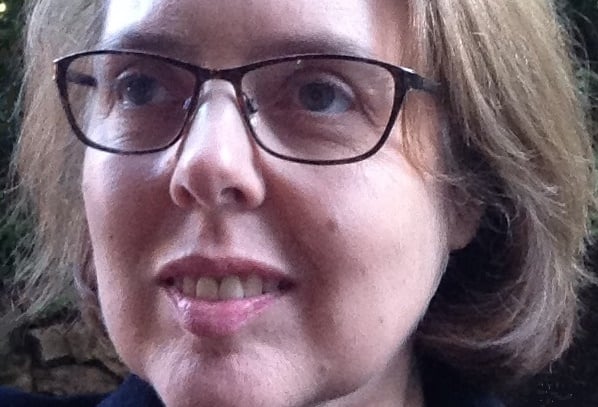
Job ladder – Mhora Samuel
As she leaves the Theatres Trust, Mhora Samuel looks back on her career in theatre, dance and cultural regeneration.
Throughout my career I’ve been fortunate enough to be able to follow my passions for performance, theatre, and buildings. I’ve worked for great organisations that have led me to explore the relationships between drama, heritage, and the built and natural environment and they ways in which they influence and shape our lives.
Centre Co-ordinator, Chisenhale Dance Space (1989–1992)
My first full time job was at Chisenhale Dance Space. I moved to London from Scotland – via Oxford – where I was introduced to the ‘body politic’ literally and philosophically. I became part of a working environment founded upon the principles of collective management by X6, which challenged the political norms of the dance world.
Chisenhale was, and still is, a place founded on the basis of sharing. It was a platform where artists showed their work and gave back in return. I basked in the challenging of the narrow definitions of dance and it reinforced my belief in the potential of dance to touch everybody’s lives.
My insatiable curiosity, a wish to support those pushing the boundaries of movement and performance, and a desire to explore the place of ‘corporeality’, then led me to work for Total Theatre.
Director, Total Theatre (1992–1998)
In my first role as a Director I was supported by a hugely committed and active board. The biggest challenge was rebranding the organisation from ‘Mime Action Group’ to ‘Total Theatre’, and redefining the place of physical and visual theatre in the worlds of theatre and drama. Another highlight was the creation of the Total Theatre Awards in Edinburgh in 1996, still going strong today.
When we moved offices to the National Centre for Circus Arts, then called Circus Space, I also witnessed first-hand the very early redevelopment of Shoreditch and Hoxton, and started to take an interest in the impact that the cultural sector could have on regenerating inner cities. I also started to become interested in the new idea of ‘cultural planning’ being developed by Colin Mercer.
Consultant, ABL Cultural Consulting (1998–2001)
My next move was to ABL Cultural Consulting, where I worked mostly on capital project feasibility studies for applications to the Arts and Heritage Lottery Funds. I was on the move, working across the UK, talking to people, listening to their stories, and helping venues, galleries and theatres, their audiences and users achieve their dreams through capital redevelopment of their buildings.
One of the biggest challenges then was the Lottery itself – projects were still being encouraged to think ‘grand design’ rather than ‘viability’. I was lucky enough to work on development of a new cultural quarter for Leicester, which in time would lead to the building of the Curve.
I also happened to be one of the MA in European Cultural Planning students working with Franco Bianchini at De Montfort University in Leicester. I became fascinated by the concept of cultural regeneration and was delighted when I was given the chance to run one of the first agencies to develop cultural and creative business enterprise in the UK.
Chief Executive, Cultural Industries Development Agency (2001–2005)
In 2001, I became the CEO of the Cultural Industries Development Agency (CIDA) based in Tower Hamlets. The business model was project based so the reality was that much of my time was spent writing bids for regeneration funding. Achieving over £5m inward investment to grow east London’s creative sector was very rewarding.
In the early 2000s, the economy was recovering from recession, property prices were rising and there was increasing concern for the future of artists’ workspaces in East London. At CIDA I worked with Space and ACME and became increasingly aware that the cultural sector had to find a stronger voice in the planning system if it was going to have any chance of holding on to its physical assets in areas undergoing redevelopment.
Director, Theatres Trust (2006–2016)
In 2006 I had the chance to put this into practice when I went to the Theatres Trust, an arms-length government advisory body with a unique role as a statutory consultee in the planning system and a remit to protect theatres.
My past ten years there have been very rich and rewarding. As well as helping over 500 theatres and community organisations develop capital projects to secure the future of their theatres, I was able to promote the value of theatres and cultural buildings in the planning system and raise awareness of the importance of viable and sustainable theatre buildings. One of my highlights was bringing together the Culture in Planning Alliance and lobbying successfully to include cultural wellbeing in national planning policy.
Mhora Samuel Cultural Projects
And what will I be doing now? I want to support artistic and creative organisations to develop the assets and projects that will help them secure their future. I won’t be leading an organisation, but under my own name I’ll be offering project management, fundraising and cultural planning services.
It’s time for a new chapter in my life and I’m looking forward to helping to create some really innovative spaces and delivering capital projects that will provide the infrastructure artists, theatre-makers and creative organisations want and really need.
Mhora Samuel is Director of Mhora Samuel Cultural Projects.
Join the Discussion
You must be logged in to post a comment.